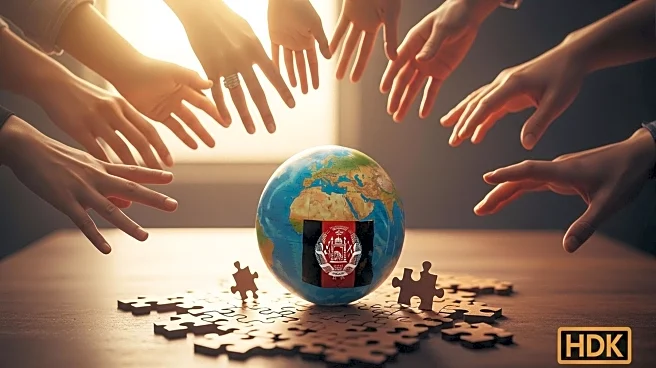What's Happening?
The United Nations has emphasized the urgency of removing debris and rebuilding after a devastating earthquake struck eastern Afghanistan on August 31, killing at least 2,200 people. The 6.0-magnitude quake caused extensive damage to low-rise buildings in the mountainous region, with homes collapsing instantly. Satellite data indicates that approximately 40,500 truckloads of debris need to be cleared. The epicenter was in Kunar province, complicating rescue efforts due to its remote and rugged terrain. Aid workers, including those from the Taliban government, have been using helicopters and walking long distances to reach affected areas. The UNDP's Crisis Bureau has highlighted the need for swift and safe debris removal and reconstruction.
Why It's Important?
The earthquake has exacerbated Afghanistan's existing challenges, including economic struggles and climate-related stressors. The destruction has left entire communities displaced, with families sleeping outdoors. The Taliban government and humanitarian organizations are providing assistance, but the scale of the disaster requires significant international support. The reconstruction of homes and infrastructure is crucial for the affected population's recovery. The situation underscores the need for Afghanistan to develop its full potential to address various crises, including restrictions on personal freedoms and aid cuts.
What's Next?
Efforts are underway to construct new roads and provide essential supplies such as food, tents, and cash assistance. The Taliban government is coordinating with international organizations to plan the construction of new homes. The UN Security Council has been briefed on the situation, highlighting the need for comprehensive development strategies to address Afghanistan's multiple crises. Continued international support and collaboration will be vital in the coming months to ensure effective recovery and rebuilding.
Beyond the Headlines
The earthquake has highlighted the vulnerability of Afghanistan's infrastructure and the need for sustainable development practices. The disaster may prompt discussions on improving building standards and disaster preparedness in the region. Additionally, the international community's response could influence future diplomatic relations and aid policies towards Afghanistan.









